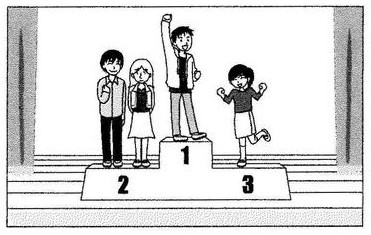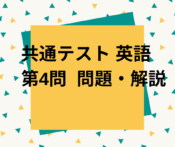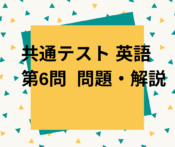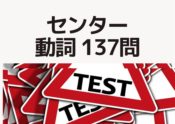【共通テスト 英語 試行テスト】H30年(2018年) 第3問 問題と詳しい解説

大手予備校で中1から高3の基礎クラスから東大クラスまでほとんどのクラスを担当しました。映像授業にも多数出演経験あり。
元東海大非常勤講師。
「大学入試英語解く得!」は最高PV数 34,212 / 日
質・量ともに日本一分かりやすい大学入試英語対策ページを目指します!
資格:英検一級、通訳案内士(英語)、TOEIC950点
趣味:海外旅行、食べ歩き
特技:将棋アマ六段 (全国レーティング選手権優勝 1998)
元技術翻訳者、元富士通
今回の内容
1. 大学入試共通テスト 試行テスト H30年実施 第3問A ー 問題
A You found the following story in a blog written by a female exchange student in your school.
School Festival
Sunday, September 15
I went with my friend Takuya to his high school festival. I hadn’t been to a Japanese school festival before. We first tried the ghost house. It was well-made, using projectors and a good sound system to create a frightening atmosphere.
Then we watched a dance show performed by students. They were cool and danced well. It’s a pity that the weather was bad. If it had been sunny, they could have danced outside. At lunch time, we ate Hawaiian pancakes, Thai curry, and Mexican tacos at the food stalls. They were all good, but the Italian pizza had already sold out by the time we found the pizza stall.
In the afternoon, we participated in a karaoke competition together as both of us love singing. Surprisingly, we almost won, which was amazing as there were 20 entries in the competition. We were really happy that many people liked our performance. We also enjoyed the digital paintings and short movies students made.

I can’t believe that students organized and prepared this big event by themselves. The school festival was pretty impressive.
問1 At the school festival, ( 16 ).
①most food at the stalls was sold out before lunch time
②the dance show was held inside due to poor weather
③the ghost house was run without electronic devices
④the karaoke competition was held in the morning
問2 You learned that the writer of this blog ( 17 ).
①enjoyed the ghost tour, the dance show, and the teachers’ art works
②sang in the karaoke competition and won third prize
③tried different dishes and took second place in the karaoke contest
④was pleased with her dancing and her short movie about the festival
2. 大学入試共通テスト 試行テスト H30年実施 第3問B ー 問題
You found the following story in a study-abroad magazine.
Flowers and Their Hidden Meanings
Naoko Maeyama (Teaching Assistant)
Giving flowers is definitely a nice thing to do. However, when you are in a foreign country, you should be aware of cultural differences.
Deborah, who was at our school in Japan for a three-week language program, was nervous at first because there were no students from Canada, her home country. But she soon made many friends and was having a great time inside and outside the classroom. One day she heard that her Japanese teacher, Mr. Hayashi, was in the hospital after falling down some stairs at the station. She was really surprised and upset, and wanted to see him as soon as possible. Deborah decided to go to the hospital with her classmates and brought a red begonia in a flower pot to make her teacher happy. When they entered the hospital room, he welcomed them with a big smile. However, his expression suddenly changed when Deborah gave the red flower to him. Deborah was a little puzzled, but she didn’t ask the reason because she didn’t want to trouble him.
Later, in her elementary Japanese and with the help of a dictionary, Deborah told me about her visit to the hospital, and how her teacher’s expression changed when she gave him the begonia. Deborah said, “It’s my favorite flower because red is the color of passion. I thought my teacher, who was always passionate about teaching, would surely love it, too.”
Unfortunately, flowers growing in a pot are something we shouldn’t take to a hospital in Japan. This is because a plant in a pot has roots, and so it cannot be moved easily. In Japanese culture some people associate these facts with remaining in the hospital. Soon after Deborah heard the hidden meaning of the potted begonia, she visited Mr. Hayashi again to apologize.
問1 According to the story, Deborah’s feelings changed in the following order. ( 18 ).
①nervous → confused → happy → shocked → sorry
②nervous → confused → sorry → shocked → happy
③nervous → happy → shocked → confused → sorry
④nervous → happy → sorry → shocked → confused
⑤nervous → shocked → happy → sorry → confused
⑥nervous → sorry → confused → happy → shocked
問2 The gift Deborah chose was not appropriate in Japan because it may imply ( 19 ).
①a long stay
②congratulations
③growing anger
④passion for living
問3 From this story, you learned that Deborah ( 20 ).
①chose a begonia for her teacher because she learned the meanings of several flowers in her class
②not only practiced her Japanese but also learned about Japanese culture because of a begonia
③visited the hospital with her teaching assistant to see her teacher and enjoyed chatting
④was given an explanation about the begonia by Mr. Hayashi and learned its hidden meaning
3. 大学入試共通テスト 試行テスト H30年実施 第3問解答・配点と正解率
| 問題番号 | 設問 | 解答番号 | 正解 | 配点 | 正答率 |
| 第3問 | A 1 | 16 | 2 | 2 | 87.5% |
| A 2 | 17 | 3 | 2 | 64.5% | |
| B 1 | 18 | 3 | 2 | 74.8% | |
| B 2 | 19 | 1 | 2 | 62.1% | |
| B 3 | 20 | 2 | 2 | 56.2% |
4. 大学入試共通テスト 試行テスト H30年実施 第3問A ー 解答、解説
3A 問1の解答、解説
問1 At the school festival, ( 16 ). 学園祭では、( 16 )。
①most food at the stalls was sold out before lunch time 屋台の食事のほとんどはランチタイムの前に売り切れていた
②the dance show was held inside due to poor weather 悪天候のためダンスショーが屋内で開催された
③the ghost house was run without electronic devices お化け屋敷は電子機器なしで行われた
④the karaoke competition was held in the morning カラオケ大会は午前中に開催された
正答の根拠は第二段落。
Then we watched a dance show performed by students. They were cool and danced well. It’s a pity that the weather was bad. If it had been sunny, they could have danced outside. At lunch time, we ate Hawaiian pancakes, Thai curry, and Mexican tacos at the food stalls. They were all good, but the Italian pizza had already sold out by the time we found the pizza stall.
「天気が悪くて残念だった。もし天気が良かったら屋外でダンスをすることができただろう」とあるので②が正解。
①売り切れていたのはItalin pizza。
③お化け屋敷は第一段落の最終文にprojectors / a good sound system という単語があり電子機器は使っていたので不正解。
④カラオケ大会は第三段落の最初の文で私達は午後に参加したとあるので不正解。
3A 問2の解答、解説
問2 You learned that the writer of this blog ( 17 ). あなたはこのブログの作者が( 17 )ことを学んだ。
①enjoyed the ghost tour, the dance show, and the teachers’ art works
お化けツアー、ダンスショー、先生の芸術作品を楽しんだ
②sang in the karaoke competition and won third prize
カラオケ大会で歌を歌い、3位を獲得した
③tried different dishes and took second place in the karaoke contest
様々な料理を試してカラオケコンテストで2位をとった
④was pleased with her dancing and her short movie about the festival
彼女のダンスと文化祭についての彼女の短編映画に喜んだ
①先生の芸術作品については記述がないので不正解。
②カラオケ大会は”we almost won”「私達はもう少しで勝ちそうだった」とあるので3位ではなく2位だったので不正解。
In the afternoon, we participated in a karaoke competition together as both of us love singing. Surprisingly, we almost won, which was amazing as there were 20 entries in the competition.
③は第二段落でハワイのパンケーキを食べ、タイカレーを食べ、メキシコのタコスを食べたとあるので前半は正解。2位を取ったのも正解なのでこれが正答。
④ダンスをしたのは彼女ではなく、短編映画を作ったのも彼の学校の生徒なので不正解。
almostは「ほとんど」という訳だけでは足りません。例えばHe was almost late for school.は「ほとんど遅刻した」ではなく「ほとんど遅刻状態だったけど遅刻はしていない」ということなので「あやうく遅刻しそうだった」が良い訳になります。
 しげT
しげT
5. 大学入試共通テスト 試行テスト H30年実施 第3問B ー 解答、解説
3B 問1の解答、解説
問1 According to the story, Deborah’s feelings changed in the following order. ( 18 ). この記事によると、デボラの感情は次の順番で変化した。
①nervous → confused → happy → shocked → sorry
②nervous → confused → sorry → shocked → happy
③nervous → happy → shocked → confused → sorry
④nervous → happy → sorry → shocked → confused
⑤nervous → shocked → happy → sorry → confused
⑥nervous → sorry → confused → happy → shocked
nervous 「緊張した」、confused「混乱した」、happy「うれしい」、shocked「ショックを受けた」、sorry「申し訳ない」
文中でDeborahの感情を表す表現を追いかけていきます。
第二段落の第1文にnervous という単語が見えます。(そもそもこの選択肢しかありませんが)
第二段落の第2文にhaving a great time とあるのでhappyを選択。
第二段落の第4文にsurprised and upset とあるのでshocked を選択。
第二段落の最終文にpuzzled「困惑した」とあるのでconfused を選択。
最後は第三段落の最終文に apologize とあるのでsorryを選択。
ということで③が正解になります。
3B 問2の解答、解説
問2 The gift Deborah chose was not appropriate in Japan because it may imply ( 19 ). デボラが選んだ贈り物は( 19 )をほのめかしているかもしれないので日本では適切ではなかった
①a long stay 長期の入院
②congratulations お祝いの言葉
③growing anger 怒りが大きくなること
④passion for living 生きることへの情熱
正答の根拠は最終段落にあります。
Unfortunately, flowers growing in a pot are something we shouldn’t take to a hospital in Japan. This is because a plant in a pot has roots, and so it cannot be moved easily. In Japanese culture some people associate these facts with remaining in the hospital. Soon after Deborah heard the hidden meaning of the potted begonia, she visited Mr. Hayashi again to apologize.
「残念ながら、日本では鉢に植えられた花は病院に持っていくべきではないものです。これは、鉢の中の植物は根があるので簡単に動かせないからです。日本の文化では、これらの事実から病院に残ることと連想する人がいます。」
とあるので①が正解です。
「鉢植えの花は病院に持っていってはいけない」という話は常識として知っていたという人も多そうです。
 しげT
しげT
3B 問3の解答、解説
問3 From this story, you learned that Deborah ( 20 ). この物語から、あなたはデボラが( 20 )ことが分かった。
①chose a begonia for her teacher because she learned the meanings of several flowers in her class
彼女は授業でいくつかの花の意味を学んだので、彼女の先生のためにベゴニアを選んだ
②not only practiced her Japanese but also learned about Japanese culture because of a begonia
ベゴニアのおかげで日本語を練習しただけでなく、日本の文化について学んだ
③visited the hospital with her teaching assistant to see her teacher and enjoyed chatting
先生をお見舞いするために教員補助と一緒に病院を訪問し、おしゃべりをして楽しんだ
④was given an explanation about the begonia by Mr. Hayashi and learned its hidden meaning
林先生からベゴニアについて説明を受け、ベゴニアの隠された意味を学んだ
①は記述なし。
②は問2から日本の文化について学んだのは正しい。また「日本語を練習した」については
Later, in her elementary Japanese and with the help of a dictionary, Deborah told me about her visit to the hospital, and how her teacher’s expression changed when she gave him the begonia. Deborah said, “It’s my favorite flower because red is the color of passion. I thought my teacher, who was always passionate about teaching, would surely love it, too.”
「その後、デボラは初級の日本語で辞書の助けを借りて、病院を訪れたこと、そして彼女が彼にベゴニアをあげたときに先生の表情がどのように変わったかについて私に話しました。」
とあるので、この件をきっかけに日本語を学んだ事が分かる。従って②が正答。
③はクラスメートと病院に行ったという記述はあるが、教員補助と行ったという記述はないので不正解。
④は林先生からベゴニアについての説明を受けていないので不正解。
大手予備校で中1から高3の基礎クラスから東大クラスまでほとんどのクラスを担当しました。映像授業にも多数出演経験あり。
元東海大非常勤講師。
「大学入試英語解く得!」は最高PV数 34,212 / 日
質・量ともに日本一分かりやすい大学入試英語対策ページを目指します!
資格:英検一級、通訳案内士(英語)、TOEIC950点
趣味:海外旅行、食べ歩き
特技:将棋アマ六段 (全国レーティング選手権優勝 1998)
元技術翻訳者、元富士通





